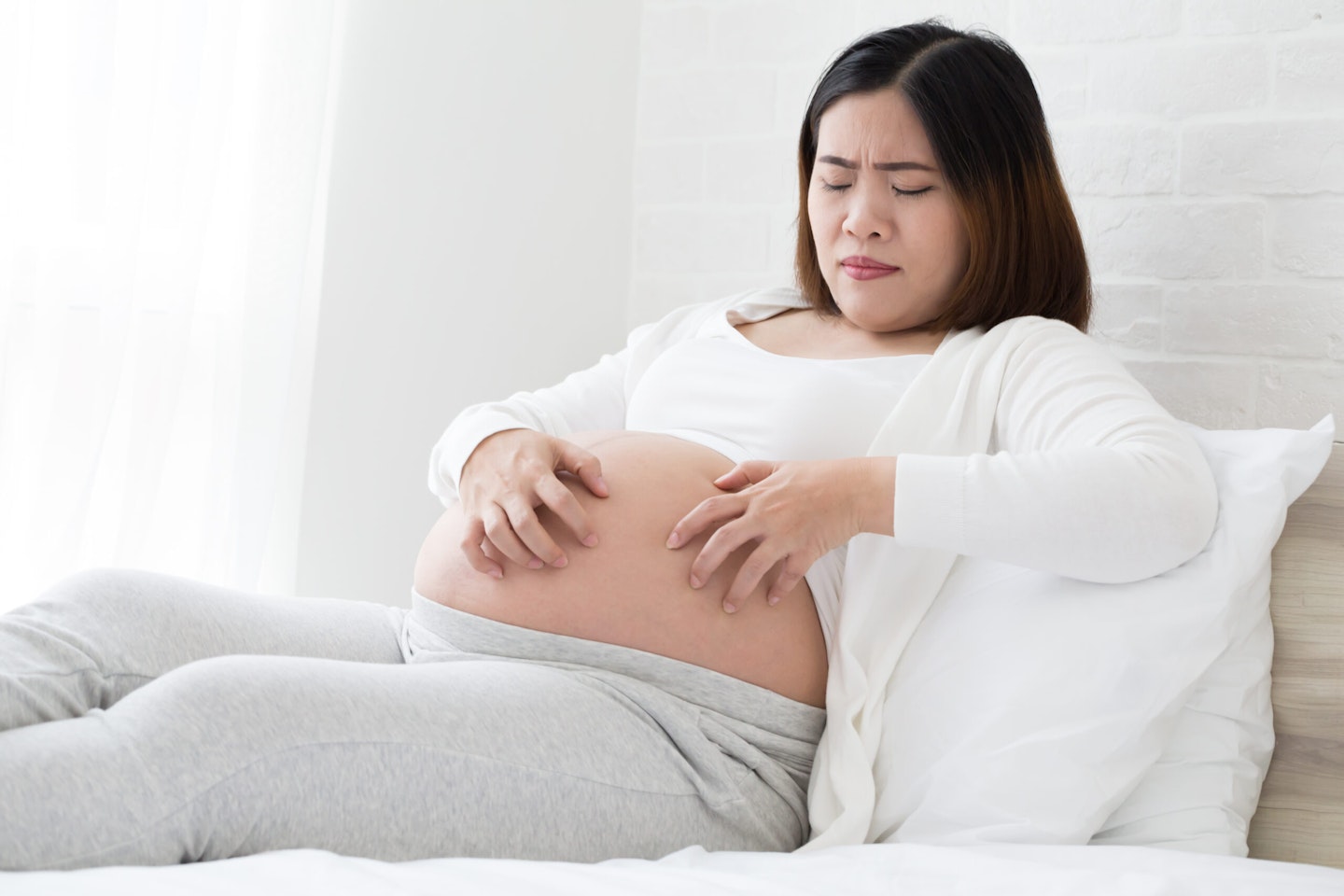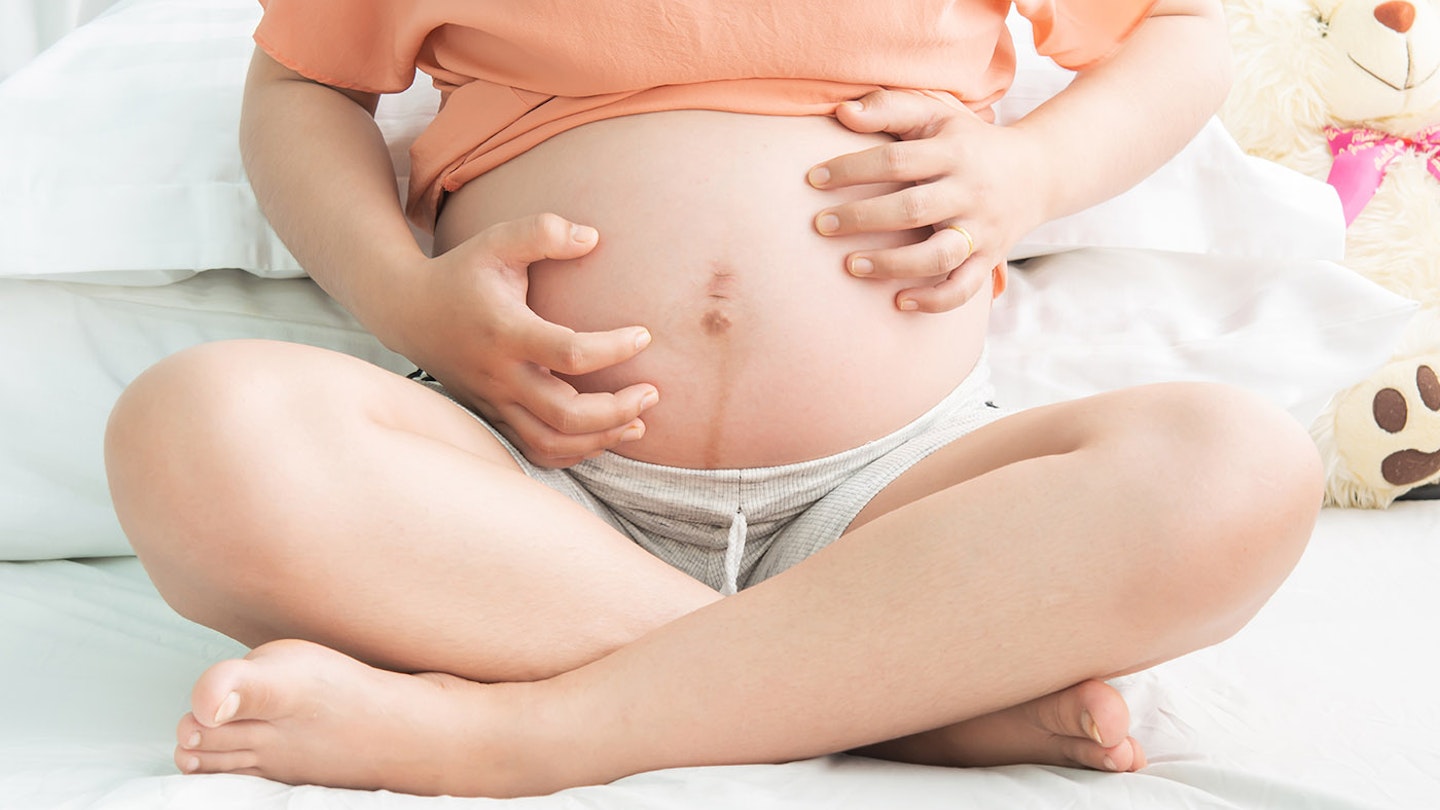Itching in pregnancy is common and one area that can get particularly itchy is your growing bump. No sooner have you had a good scratch that the irritation creeps back across the skin on your tummy. It can be infuriating, but it’s also completely normal.
‘It’s quite usual to experience itching over your bump as the skin starts to stretch beyond its comfort zone,’ says midwife Jules Robertson.
‘Itching typically starts at around 28 weeks, when your bump is really starting to show. It can occur much sooner, typically when hormone levels of progesterone and oestrogen start to rise. It’s thought that oestrogen in particular may affect the skin, bringing the pregnancy glow, but also causing sensitivity and itching.’
These pregnancy changes upset the natural moisture balance and elasticity of skin, especially across a rapidly expanding tummy.

Excessive dryness can cause skin irritation, while damage to deeper layers can result in stretchmarks that itch as they heal.
This minor skin inflammation – technically termed ‘pruritus’ – can be calmed and rarely requires medical treatment.
Look out, though, for more pronounced irritation with an obvious rash. ‘This could be a condition called polymorphic eruption of pregnancy, which can cause unbearable itching and red, inflamed areas,’ explains Jules. ‘Your GP may suggest an emollient cream, or prescribe short-term antihistamines or steroids if the problem starts to affect your sleep.
‘Bear in mind too that pregnancy may trigger eczema, especially if your immune system is lowered. It can also increase the effect of any allergic reactions. But in most cases, an itchy bump is simply that.
'Symptoms should soon disappear once your baby is born, but seek medical advice if your skin becomes broken or sore due to scratching.'
Check your symptoms
Pregnancy itches eleswhere on your body might be a sign that you need to talk to your GP. Severe itching, at its worst on the palms of your hands and the soles of your feet, without a rash, could indicate a liver disorder called intrahepatic cholestasis of pregnancy (ICP), also known as obstetric cholestasis (OC).
‘Symptoms include pale-coloured faeces, yellowish, jaundiced skin and the itching can be more troublesome at night,’ says Jules. ‘If you have these symptoms visit your doctor. If blood tests reveal this is the cause, you will be monitored closely throughout the rest of your pregnancy to protect you and your baby.’
ICP affects 1 in 140 pregnant women in the UK and symptoms usually start from around 30 weeks of pregnancy, but can develop as early as 8 weeks.
How to get relief from itching in pregnancy
1. Tend to your skin
‘Itchiness is often worse in winter when central heating can dry out the skin,’ says Jules. She advises placing bowls of water near radiators to humidify the air. Avoid strong detergents and perfumes and choose soap with a mild pH balance. Apply plenty of moisturiser within three minutes of bathing to lock in moisture.
Carly Hurd is a mum of two and 26 weeks pregnant. She says: ‘My bump has been getting more itchy since around 15 weeks. I usually suffer from dry skin, which is probably making it worse. I use The Spoiled Mama Indulge Body Polish (£28, effortlessskin.com) just before I get out of the shower. It leaves a film of oil on my skin that really helps.’
2. Have an oatmeal bath
Oatmeal is an age-old remedy for itchy, irritated skin. Place a handful of oats in the centre of a muslin square (we’re guessing you’ll have stocked up on these!) and tie it closed. Pop this in the bath, along with a spoonful of olive oil, slip in and relax. Beware of the extra slippery bath surface as you climb in and out.
3. Choose natural fabrics
Tops in synthetic fabrics such as acrylic are likely to leave you clammy, worsening any symptoms. Choose breathable natural-fibre fabrics such as cotton, instead. Try a hypoallergenic bamboo jersey birthing wrap (£44.99, bamboomama.co.uk). This has a silky feel and lets your body adjust to its natural temperature. It can be used for labour and breastfeeding too.
4. Keep your cool
A cool shower can bring instant relief. Also, make a spritz with two-parts rosewater and one-part filtered water. Keep it in the fridge to spray over your bump. Refrigerate your body lotion too.
5. Stay hydrated
You should be drinking 1.6 litres of water a day. If you’re having difficulty downing that much, try non-caffeinated fruit teas or munch on chunks of fruit and veg with a high water content, such as watermelon.
6. Use coconut oil
It’s nature’s moisturiser. Smooth it on your bump to soothe the skin.
